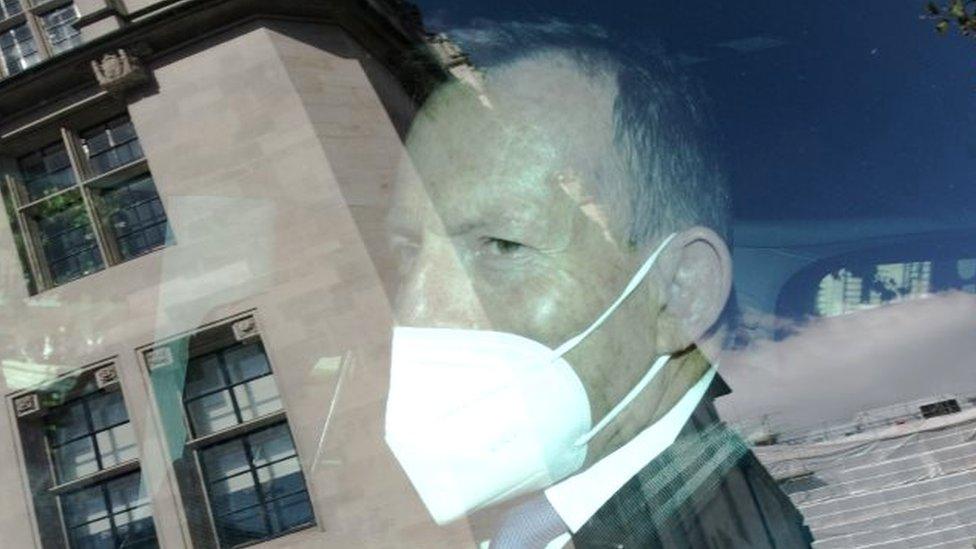Tony Abbott in talks over Brexit trade role with UK government
- Published

Tony Abbott is in the UK for 10 days
Former prime minister of Australia Tony Abbott says he has spoken to British ministers about taking on a role in post-Brexit trade talks.
"I have had some discussions with members of the British government. I am more than happy to help but there is nothing official as yet," he told MPs.
He told the Commons Foreign Affairs Committee the UK should "not fear a so-called hard exit" from the EU.
He declined to offer details of his possible role with the UK government.
But he added: "I would be doing it as a private citizen. I don't think there would be any requirement for Australian government approval."
He told the committee: "As far as I'm concerned, it would be in both Britain's interests and Australia's interests to conclude a very full and comprehensive free trade deal as quickly as possible."
'No deal basis'
This should include "no tariffs or quotas on goods, full mutual recognition of standards and qualifications" and "freeish movement of people for work not welfare," he added.
He said he hoped the EU "comes to its senses" and offers the UK "at least a Canada-style free trade deal".
But he added that the UK should not fear a "no deal" exit, as it was "already doing so much on a no deal basis anyway".
Mr Abbott, who was taking part in an online meeting with the select committee, is in the UK for 10 days.
He said he had been granted permission to travel from Australia, where the borders are currently closed due to the coronavirus pandemic, but he will be spending 14 days in "hotel quarantine" on his return, at his own expense.
Reports that Mr Abbott, who was Australia's prime minister between 2013 and 2015 is being lined up to work alongside International Trade Secretary Liz Truss have been met with anger from UK opposition parties and some Conservative MPs.
'Bad idea'
Labour's shadow International Trade Secretary Emily Thornberry described Mr Abbott as a "Trump-worshipping misogynist," adding that it was "staggering" that Prime Minister Boris Johnson would think he was "the right person to represent our country overseas".
Conservative former minister Caroline Nokes, who chairs the Women and Equalities select committee, said appointing Mr Abbott to a Brexit trade talks role would be "such a bad idea".
Caroline Nokes says appointing former Australian PM Tony Abbott as a UK trade representative would be "awful"
Speaking to Jo Coburn on the BBC's Politics Live, Ms Nokes said: "I am not sure I can come up with words for how awful I think it is.
"But look at Liz Truss, one of the few women to hold a big job in this government. She is president of the board of trade and she's being told she's got to job share with a bloke from Australia.
"I just think - Emily Thornberry and I seldom agree on anything - but she's right, he's a misogynist.
"He has very poor views on LGBTQ rights, and I just don't think this is a man who should be anywhere near our board of trade."
Mr Abbott who led Australia's Liberal Party between 2009 and 2015, was challenged about some of his past comments at the select committee hearing.
China deal
Labour MP Claudia Webbe quoted remarks attributed to him in 2012, that men were by physiology or temperament, more adapted than women to exercise authority and issue commands, and asked if, in the light of that opinion, he would have difficulty accepting the authority of Liz Truss.
Mr Abbott said he "wasn't sure" he had ever used those words, and that it "doesn't sound like anything I've said".
The former Australian prime minister is said to have struck up a friendship with Mr Johnson when he was foreign secretary.
He told the committee the free trade deal he negotiated with China in 2014, had been struck before evidence of human rights abuses, the "bullying of other countries" and other concerns about China "under the current leadership" had become apparent.
"Maybe we were looking at China through overly rose-coloured glasses back then but certainly we are not now," he said, but added that the deal had "been at least as beneficial for Australia as it has been for China".